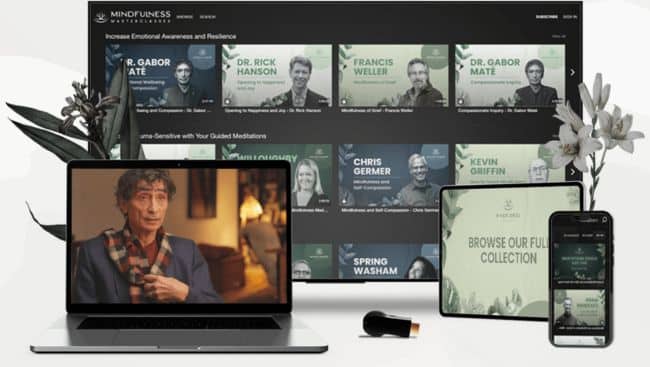This randomized control trial found that mindfulness training increased pain tolerance, but this was not related to the acquisition of mindfulness skills.
Conceptual Mindfulness vs. Experiential Mindfulness
One of my dearest friends and I were talking on the phone last week.
She is struggling with a deeply ingrained habit that she is able to notice but still finds herself very caught in. (I can empathize as I am aware of an old way of being that no longer serves me – one that I too get continually caught in.)
Frustrated, she asked: “So I just keeping noticing when I’m caught in the habit and bring [my attention] back to my breath and body?!”
We both laughed – because we both know how conceptually this sounds easy, yet how experientially it’s so very challenging.
To conceptually understand the benefits of directing your attention to your breath and body is not the same thing as actually directing your attention away from your thinking mind or sticky emotions, into the alive, felt-sense of your body.
Conceptual Mindfulness vs. Experiential Mindfulness is a subtle, yet important distinction in Mindfulness practice that I remind my students, clients and especially myself of often.
Conceptual Mindfulness is the intellectual understanding of mindfulness – its benefits, certain philosophies, particular lineages and practices and even new scientific studies and findings.
Conceptual Mindfulness is an important part of learning mindfulness. It offers us new perspectives and insights.
You may find deeper understanding in dharma talks or lectures. New language and skills in books and current research. Resonate with a particular lineage and its philosophy. Be inspired by certain teachers. Even awakened by meditations and somatic practices that help you find a new way of attending and being.

Conceptual Mindfulness creates the groundwork for understanding and intention, which starts to create the path to a mindful life. Experiential Mindfulness is the actual steps you take along the path.
Experiential Mindfulness, on the other hand, isn’t a conceptual practice. It is consciously and continuously directing your attention into the aliveness of the present moment – moment to moment, day to day, week to week, month to month, year to year, for the rest of your life – and engaging with what is unfolding from the openness and presence of your awakening attention and awareness.
This means cultivating the habit of recognizing when you’ve lost conscious volition of your inner attention, letting be what your attention is caught in, and engaging your mindfulness practices – practices like breath and body awareness – to reestablish your attention in your embodiment and the present moment.
Psychologist and author Les Fehmi in his book The Open-Focus Brain: Harnessing the Power of Attention to Heal Mind and Body puts it this way:
Can you imagine a world where we are all living in Open Focus, dissolving our pain, anxiety, restlessness, boredom, uncertainty, and chronic dissatisfaction? Can you imagine a world where we are free from the tyranny of mental content, dwelling in the spacious context of our awareness? Can you imagine freely giving and receiving love, merging with the world instead of feeling isolated and separate from it, and sensing and experiencing the world also as the wondrous place that it is? This is possible only when we assume fully our role as attender and practice a flexible deployment of attention.
Conceptually you know what mindfulness is, you know why it’s important for your life, your family’s life, and your client’s life. However, putting it into practice each moment takes deep intention and commitment to practice.
You’re learning and building a skill that takes time, as well as gentle, compassionate effort and maybe most importantly, practice.
It’s easy to let your attention drift during benign moments like doing the dishes, taking a shower, or driving in the car. And it can feel beyond challenging to be present when you’re spinning or stuck in a deeply ingrained way of perceiving or being.
Conceptual Mindfulness creates the groundwork for understanding and intention, which starts to create the path to a mindful life. Experiential Mindfulness is the actual steps you take along the path.
Wendell Berry calls this “a journey of one inch, very arduous and humbling and joyful, by which we arrive at the ground at our own feet, and learn to be at home.”
Practice:
Set a clear intention: Set a clear intention to build the skill of developing conscious volition over your inner attention. Something as simple as, “May I be present to the aliveness of the moment today.” Write it somewhere where you know you will see it throughout the day or create a reminder on your phone.
Cultivate the habit of remembering: When you are reminded of your intention, notice if in that moment you are present or if you had lost conscious volition of your attention.
Practice engaging your attention: If you noticed your attention had wondered into the workings of the mind, let be what your attention is caught in and begin to actively awaken and shift your attention back to your embodiment and the present moment.
Pay attention: Not only pay attention to the moment, but also open your attention to what unfolds within you as you shift your attention into the present moment. Is there a little more space? Aliveness? Patience? Awareness? What happens when you begin to lean into or even live into what is unfolding.
Rebecca Brenner is a best-selling author, teacher, speaker and practitioner of the integrative healing arts.












